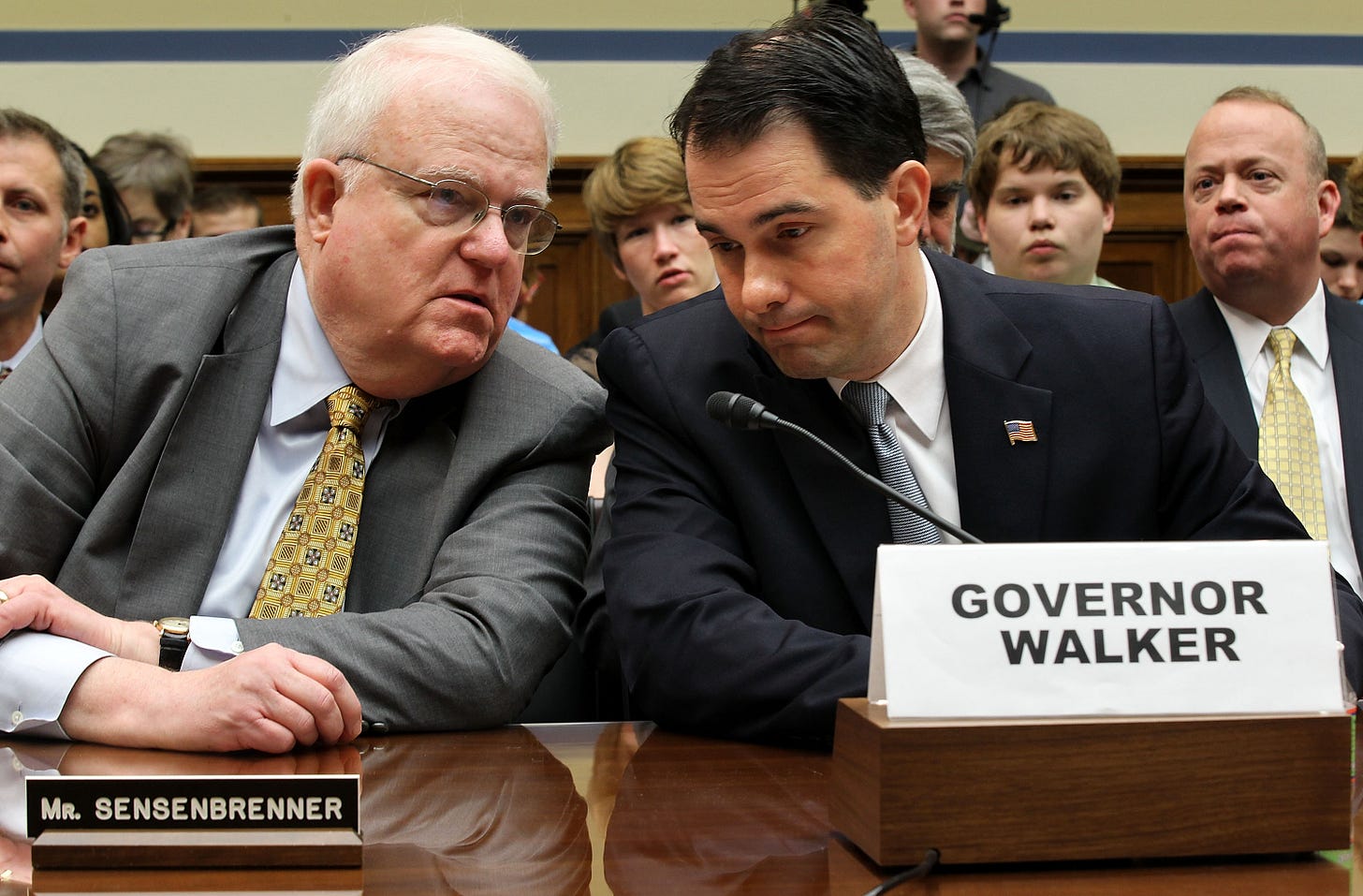A GOP Spat in Wisconsin
Jim Sensenbrenner might be retiring, but he’s still plenty influential in his home state. Just ask Scott Walker.

Veteran Rep. Jim Sensenbrenner announced Wednesday he was stepping down at the end of this term. The former chairman of the House Judiciary Committee has been in Congress since 1979, is the second-longest serving member of the House, and is the dean of Wisconsin's congressional delegation. (BTW: there is a negative zero chance that the Dems will pick up his open seat.)
I go way back with Sensenbrenner. In 1974, when I was 19 years old, I ran against him for the state assembly. In a sign of the electorate’s supremely good judgment, I lost by about 50 points and Sensenbrenner went on to become one of the House’s genuine heavyweights. His retirement marks a rather dramatic stage in the changing of Wisconsin's GOP guard—both the old guard and the new. He was elected to Congress eight years before Tommy Thompson was elected governor. Thompson left office in 2001 and lost a Senate election in 2012 to Democrat Tammy Baldwin. By then, the old guard had been displaced by a new generation, which seemed poised to dominate state politics for the next generation. But the last two years have seen the departure or defeat of Governor Scott Walker, Speaker Paul Ryan, former RNC chairman and White House Chief of Staff Reince Priebus, and Rep. Sean Duffy. NeverTrump Rep. Reid Ribble also retired at the end of 2016.
The transition has not always been smooth, as illustrated by one extraordinary incident this summer.
Back in June, the entire state Republican establishment gathered to pay tribute toSensenbrenner’s 50 years of public service. Everyone was there: Senator Ron Johnson, Paul Ryan, former Lt. Gov. Rebecca Kleefisch, the entire GOP congressional delegation—Bryan Steil, Mike Gallagher, Glenn Grothman, and Sean Duffy—along with the GOP leaders in the state legislature.
There was only one notable no-show: former Governor Scott Walker. The backstory is fascinating.
Despite his earlier criticisms during the presidential campaign, Walker has doubled down on his cheerleading for President Trump since losing his re-election bid last November. This has included his full-throated support for Trump’s emergency declaration on the border.
In February, Walker sat in as a guest host on a local talk radio show and used the opportunity to rip Republicans who had not fallen in line. The Milwaukee Journal-Sentinel’s Dan Bice reported:
In one 25-minute segment, Walker took up the House's resolution on Trump's emergency declaration on Feb. 26, the same day as the vote.
The former governor was sharply critical of a letter published in the Washington Post by U.S. Sen. Thom Tillis, a North Carolina Republican, explaining why he opposed the president on this issue.
Tillis said he supported building a wall along the southern border but that he couldn't go along with the emergency declaration. He said members of Congress should not go along with an effort to reduce their own power.
"I’m actually shocked," Walker said on the afternoon radio show. "I might have expected this from some of the more liberal, or seemingly liberal, members of the Republican conference out here. But to me, not just that he’s against the president on this, but that argument is so fundamentally wrong." Tillis eventually folded under pressure and backed Trump. But Sensenbrenner did not.
He was one of just 13 Republicans who voted against the emergency order, along with fellow Wisconsin Rep. Mike Gallagher.
"Emergency declarations have been used by presidents since Carter basically to deal with issues that Congress could not legislate quickly enough to make sure the issue was properly handled," Sensenbrenner said at the time. "This is not one of those."
So Sensenbrenner took Walker’s criticism personally. "It was obvious to people in the audience," Sensenbrenner said. "He was criticizing my vote on a very controversial issue."
Shortly afterward, the chairwoman of the GOP’s 5th Congressional District caucus publicly and unceremoniously disinvited Walker from the group’s annual meeting. “I supported her disinviting him,” Sensenbrenner told Bice. "I didn't want (Walker) to give a speech at a caucus, which is basically my base of support, and run the risk of being criticized for my vote, which was a matter of principle.”
Wounds have apparently not healed.
Asa result, Walker, who had been at the center of the state’s GOP for the last decade and who clearly relished a comeback in the state, found himself on the outside of one of the biggest GOP events of the year. The next month, he announced that he was stepping back from Wisconsin politics to become president of the Young America’s Foundation.
The two incidents are likely not connected. But one of the iron laws of Wisconsin politics, a close observer remarked to me, is “Never mess with Jim.”


